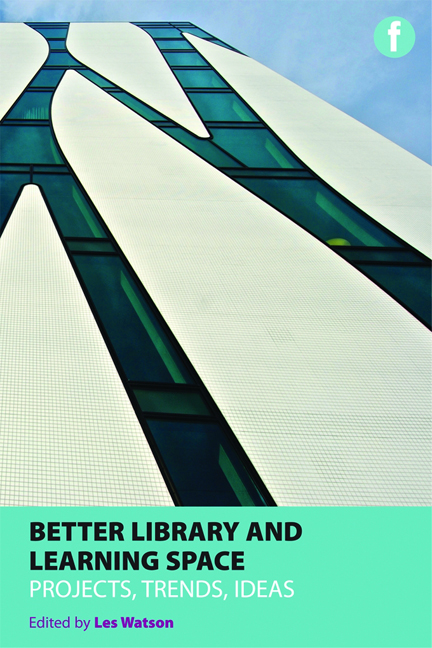Book contents
- Frontmatter
- Contents
- Case studies
- Acknowledgements
- Contributors
- Introduction – about this book
- PART 1 PROJECTS AND TRENDS
- PART 2 TRENDS AND IDEAS
- Introduction
- 7 Library space and technology
- 8 Library space and learning
- 9 Key ideas on space
- 10 Thinking it through
- Summary to Part 2
- PART 3 IDEAS AND FUTURES
- Index
8 - Library space and learning
from PART 2 - TRENDS AND IDEAS
Published online by Cambridge University Press: 08 June 2018
- Frontmatter
- Contents
- Case studies
- Acknowledgements
- Contributors
- Introduction – about this book
- PART 1 PROJECTS AND TRENDS
- PART 2 TRENDS AND IDEAS
- Introduction
- 7 Library space and technology
- 8 Library space and learning
- 9 Key ideas on space
- 10 Thinking it through
- Summary to Part 2
- PART 3 IDEAS AND FUTURES
- Index
Summary
Introduction
Libraries have always been places of learning, supporting personal exploration of the information and knowledge held in their collections and also being a place for researchers to learn and for the learner as researcher. Equally instruction on how to make best use of the resources held by the library and how to access its services has always been part of the work of the library, through either documentation distributed to users or specific training courses. This role has further developed with the growth of eresources, with libraries acting as information brokers. In these ways libraries are already part of the national and international learning landscape, but can play a greater role in community, societal and individual learning support for learners and their learning by developing better library learning space.
In the late 20th and early 21st century theories and models of information literacy have been developed – for example in the UK both the Society of College, National and University Libraries (SCONUL), supporting libraries in the higher education sector and national UK libraries, and CILIP: the Chartered Institute of Library and Information Professionals, providing support to all member librarians, developed structured models for the provision of information literacy training and education. Some of these models were informed by current learning theories, for example, the SCONUL seven pillars model (2011) (with the recent addition of a cyclical representation of the pillars) is strikingly similar to Kolb's model of learning (1984), acknowledging that for learning to occur the learner requires a phase of reflection, to then learn from the experience, and then plan and conceive the next experience. However, in practice most users of these models do not consider all of these aspects but tend to focus on information finding. Making the shift from an operational ‘consumer view’ of access to learning resources towards the process of learning is one of the challenges for models of information literacy and the library's wider involvement in learning.
In the 21st century technology has become a key component of the skills environment required to access and handle information and develop new knowledge. Inability to use technology effectively is an insurmountable barrier to information access and use.
- Type
- Chapter
- Information
- Better Library and Learning SpaceProjects, trends and ideas, pp. 109 - 116Publisher: FacetPrint publication year: 2013
- 1
- Cited by



